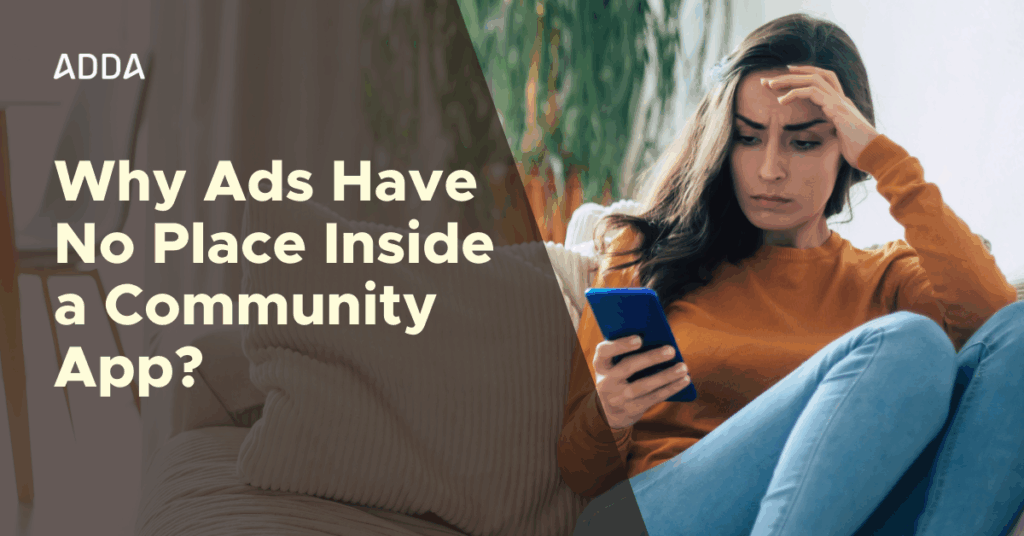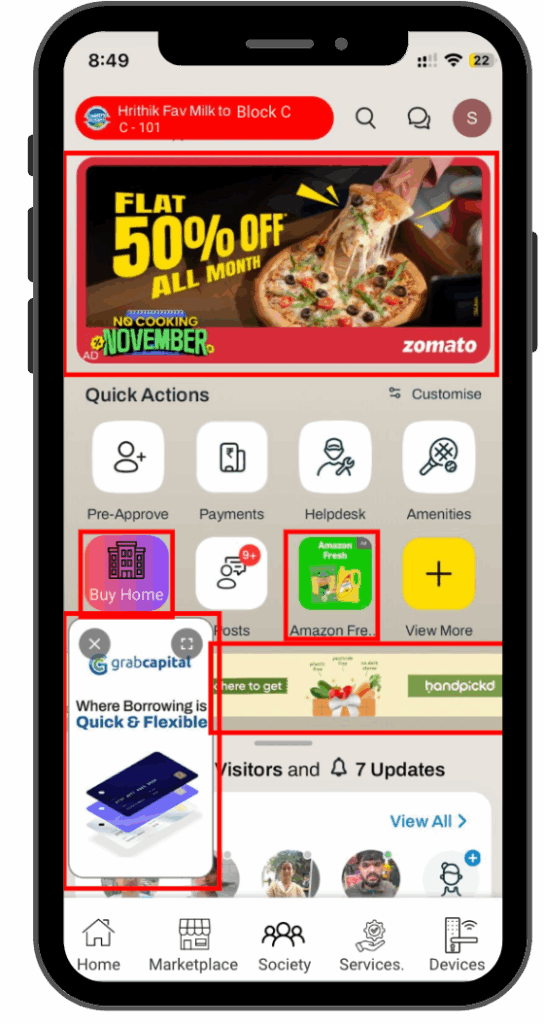
Why Should a Community App Should Never Be Compared to Facebook or Instagram?
Every once in a while, someone asks a question that sounds perfectly sensible on the surface:
“If Instagram and Facebook run successfully on ads, why can’t community apps do the same?”
It’s a fair question… until you look at what each of these platforms is actually built for. The moment you examine the purpose behind a community app versus a social media app, the comparison falls apart almost instantly.
A community app is not just another app on your phone. It is the digital extension of your home.
And your home plays by very different rules.
Let’s break this down gently, without jargon or theatrics.
Table of Contents
What Do You Actually Use Instagram or Facebook For?
Let’s be honest — you open Instagram when you’re bored, procrastinating, or waiting for your food delivery. You open Facebook to scroll casually, check in on people, or fall into a rabbit hole of random videos. These apps are designed to entertain you, distract you, give you a break from your day.
If an ad appears between two Reels, you may roll your eyes… but it doesn’t affect your life.
You keep scrolling anyway.
Entertainment apps thrive on noise, colour, and endless content.
Their goal is simple: keep you inside for as long as possible.
What Do You Use a Community App For? (Both Sides of the Story)
Now compare this with your community app.
A community app is not like social media, where you wander in without a plan. When you open a community app, it’s usually because something needs your attention right now. And sometimes, it’s the reverse — the community needs to reach you with something important.
That’s why even with these distractions, ads squeezed between updates, (or in case of most of ADDA’s competitors whose 70% of screen is filled with Ads) completely break the flow. A community app is supposed to work more like the intercom system of your building than an entertainment feed.

Let’s look at both sides of this — residents who need to get things done, and community admins who need to reach residents without noise.
When You Open the App Because You Need Something Done Fast
Residents use the app with a purpose. And usually, that purpose needs speed and focus.
- When something breaks suddenly at home: Say, your kitchen basin starts leaking like a badly behaved tap. You want to immediately raise a helpdesk ticket so the facility team can send someone over. You don’t want to scroll past ads for “renovation experts in your area” before you can even explain the issue.
- When you’re racing to book popular amenities: Every building has that one amenity everyone fights for on weekends — most commonly the badminton court. You need the app to load quickly so you can grab your slot before the rest of the society wakes up. One ad at the wrong moment and poof… someone else has already taken it.
- When you’re checking simple but important things: Whether your maintenance payment succeeded, or your domestic worker has checked in, or your package has arrived at the gate — these are everyday tasks that need clarity. You want to open, check and move on. No clutter, no chaos.
- When you’re tracking an issue you’ve raised: Maybe yesterday’s complaint about the lift has been resolved. Maybe you’re checking if a staff member has updated a ticket. These are quick-check moments. Ads in the middle can make you miss important updates altogether.
In all these situations, your intention is clear. You’re not browsing. You’re doing.
And doing requires focus. Ads just don’t have any place in this!
When the Community Needs to Reach You Quickly and Clearly
The flow works the other way too. A community app is just as important for the updates coming to you as for the actions you perform. And these updates often matter even more because they affect everyone’s daily life.
- Maintenance reminders and billing updates: When the treasurer needs to remind residents about dues, the message must reach you cleanly, without being sandwiched between ads about home loans, pizza offers or water purifiers.
- Urgent water or power shutdown announcements: If the community admin sends out a 7 AM alert that water will be off from 10 AM, it cannot be mixed with ads for organic coconut water. Residents will miss the important update, and chaos will follow.
- Emergency notifications that need immediate action: For example, a neighbour may have raised an SOS alert, or there might be a fire drill, or a medical urgency. Even a two-second delay because of an ad is not acceptable in these situations.
- General community governance updates: AGM announcements, security guideline changes, festival event details — these are the small building blocks of community living. If they get lost between ads, communication trust breaks down.
In all of these cases, the community depends on the resident actually seeing the message.
And when attention gets diluted, governance gets diluted.
Why Ads Fit Naturally in Entertainment Apps — But Not in Community Apps
Ads work in apps like Instagram because those apps were built for engagement. Ads don’t interrupt the core function; they support it.
But in a community app, ads directly conflict with the purpose.
Imagine this:
You open ADDA to check if there’s a water supply issue.
Before you see the update, an ad for a sofa sale appears.
Your brain automatically starts scanning — Is this important? Is this noise?
Suddenly, the urgency is diluted.
Or worse — you scroll past an important fire drill reminder because it got visually mixed with too many distractions.
In community management, distraction is not a small inconvenience.
It can lead to Huge Huge issues, which can cause accidents and personal loss as well!
A community app must be quiet, focused, and distraction-free — the exact opposite of an ad-powered ecosystem.
What Happens Emotionally When Ads Enter a Community Space?
A subtle but powerful shift occurs.
The resident’s brain moves from:
“Everything here is important to me,”
to
“Everything here is mixed with noise — I’ll scan later.”
You know what “later” means.
It means never.
Now imagine this happening with security alerts, water notices, or AGM updates.
The entire purpose of the app collapses.
Community Apps Contain Deeply Personal Data — Not Browsing Behaviour
The biggest, most critical difference is the kind of data involved.
Facebook knows what you like.
Your community app knows where you live.
Instagram knows your interests.
Your community app knows your contact details, family members, vehicles, visitor logs, domestic staff, payment history and more.
This is not data that can sit anywhere near an advertising ecosystem.
It is too sensitive, too detailed, and too easy to misuse.
Even “anonymous” community data can be reverse-engineered into patterns that reveal far more than you’d ever want a commercial advertiser to know.
And once ads enter the system, advertisers will demand segmentation, insights, behaviour groups, engagement stats — which inevitably leads to data movement.
There is no world where “ads” and “airtight privacy” coexist.
Why Comparing ADDA to Instagram is Like Comparing a Fire Alarm to a Stand-up Comedy Show
One is built to inform you.
The other is built to entertain you.
One requires focus.
The other thrives on distraction.
One handles property addresses and payment patterns.
The other handles memes and trending dances.
Putting ads inside a community app is like putting stand-up comedy inside a fire drill announcement.
Both may be useful in their place — but not together.
Attention vs Engagement — The Core Philosophical Difference
Community apps need attention.
Social apps need engagement.
Ads are built for engagement.
Governance tools must be built for attention.
Mix them together and both systems break.
Imagine a town hall meeting where someone is trying to discuss water supply… and suddenly an ad plays for modular kitchens. It’s absurd in the physical world; it’s equally absurd in the digital world.
So Where Does ADDA Stand in All This?
ADDA chose the simplest, most honest path possible:
Zero Ads, forever. Zero Data Selling, forever.
Our revenue comes from subscriptions — not advertisers.
That means:
- No third-party pressure
- No profiling requirements
- No segmentation demands
- No external monetisation
- No data bleeding into external networks
The community remains the only customer.
The community’s needs remain the only priority.
The community’s safety remains the only mission.
Final Thought: Your Home Is Not an Advertising Channel
Instagram is where you unwind.
ADDA is where you stay informed.
One feeds on noise.
The other depends on calm, connected experience.
Your home deserves purity of communication.
Your community deserves clarity.
Your family deserves privacy.
And that is why ADDA will never turn your residential life into an advertising channel — not today, not ever.